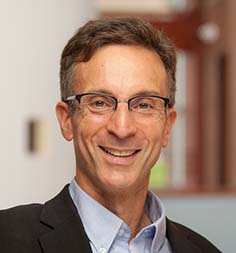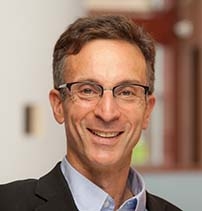PERI ECONOMIST INTERVIEW SERIES
Michael Ash
This is part of PERI's economist interview series, hosted by C.J. Polychroniou.
Read Michael's bio here.

C.J. Polychroniou: Why did you choose economics, and how did you end up teaching at UMass-Amherst?
Michael Ash: My longstanding (half) joke about choosing economics is that my mom is sociologist and my dad is a mathematician, and I split the difference. That’s only half a joke because I’m fascinated by sociology – understanding social stratification, social groups including classes, genders, and racial and ethnic groups – and I’ve always had the good fortune to enjoy mathematics and quantitative methods. Economics helped me bring these two interests together.
I have always wanted to intervene for justice in economic and social affairs. I thought economics would give me the tools to understand the problems – like deprivation, inequality, and unemployment – and to develop solutions. At the same time, economics is kind of a rough, sometimes anti-humanistic field. My great aunt Miriam Rifkin (Ash), a lifelong communist who ran for Comptroller of Connecticut on the CP ticket in 1932 (and lost, in case you hadn’t heard) warned me when I headed off to graduate school in fall 1992 that I should be wary of economistic thinking. She was right, and it took me a long time to sift through what was valuable insight and what was empty ideology in my economics education.
The appointment at UMass Amherst was a dream come true. I was very lucky to graduate with my Ph.D. in 1999, during a brief period when UMass Amherst was on a hiring spree between the periodic contractions caused by crises in capitalism. My advisors, especially Michael Reich, recommended me very strongly to the UMass department. My other advisors, George Akerlof and David Card, thought that UMass Amherst and I would be a great fit. And they were right! I hope it’s not conceited, but I like to think that George and David saw my placement as a contribution to building a healthier ecosystem in economics.
Bob Pollin had just arrived at UMass Amherst, and he and Jerry Epstein had founded PERI with the kind of resources for research, graduate education, and policy impact that UMass Amherst needed to take its longstanding intellectual depth to the next level. So it was a very exciting time to arrive, and I was really honored to be recruited. Right off the bat I got to co-teach a graduate econometrics course with Bob Pollin – a course that we have now taught together some twenty times in 22 years – and that was a terrific way to learn how to teach.
CJP: Your doctoral dissertation at University of California–Berkeley focused on the structure of the U.S. labor market, with George Akerlof as your advisor. Other than Akerlof, what other economists have had a major influence on your thinking about economic affairs?
MA: Michael Reich probably had the single largest influence on me in terms of learning about how labor markets function. His book Segmented Work, Divided Workers with David Gordon and Rick Edwards remains my favorite labor economics book. I also frequently refer students to Michael’s work with Clair Brown on the dysfunction of U.S. labor markets and labor relations. They had the marketing misfortune to finish their book comparing U.S. and Japanese labor markets right at the onset of the Japanese economic meltdown; so it got less attention than it deserved.
David Card was also a terrific mentor and one of the most brilliant and patient teachers I have ever had (pre-school through Ph.D.). His willingness to sift through output and to help me (and all of his students) develop their own ideas remains inspirational.
I’m happy to say that I’ve continued to learn an enormous amount since coming to UMass Amherst. The list of colleagues at UMass Amherst who have built my understanding of the economy, and to avoid leaving anyone out of a long list, I’ll mention only two, Jim Boyce and Jim Crotty. I’ve already written an extensive tribute to Jim Crotty in my book with Francisco Louçã, Shadow Networks. I could not be prouder to work in a building named for Jim Crotty and his wife Pam. Jim Boyce turned my attention to environmental justice. I had been something of a skeptic on the liberatory potential of environmental movements – they were fine for privileged conservationists but not really of interest for radicals. Jim’s brilliant work on power, inequality, and the environment completely changed my mind and my career.
For that matter, Francisco Louçã, a hero of the Portuguese Revolution, a successful organizer of one of the most exciting left parties in Europe, and a brilliant professor of economics, has been one of the greatest and kindest mentors of my middle career.
CJP: Has the US labor market changed significantly since you wrote your dissertation?
MA: The labor market is like it was then, only more so. The main points were the arbitrary inequality and decay of career stability in U.S. labor markets. The main theme was that these outcomes are not at all natural but are instead structured in line with the changing structure of capitalist ownership and control.
CJP: What new areas of research do you see yourself undertaking in the years ahead?
MA: The biggest and most unexpected change for me in mid-career has been developing my research in macroeconomics and finance. I have always been a “macro wannabe.” But only in the past 7 or 8 years, research with Thomas Herndon, Bob Pollin, Arin Dube, and Deepankar Basu on how public debt affects economic growth and the study with Francisco Louçã on the integration of finance into the global economy, published by Oxford University Press in 2018 as Shadow Networks: Financial Disorder and the System that Caused Crisis, have made this interest a real part of my work.
The arrival of Larry King and Katherine Moos in the Economics Department at UMass Amherst and the development of both Bob Pollin’s and Jerry Friedman’s research programs on universal health care in the United States have rapidly built UMass Amherst as a center for radical political economy of health, health care, and public health. I had a one-foot-in relationship with the economics of health – reaching it tangentially through health care labor markets, through environmental economics, and through undergraduate teaching. The infusion of excitement, a more welcoming policy environment, and new colleagues, coupled with the Covid crisis, make the radical political economy of health an exciting prospect for me.
I have very recently joined an interdisciplinary project on energy studies, the Energy Transition Institute, which is noteworthy for putting equity and social justice at the core of the energy transition problem instead of a peripheral problem to be fixed by retrofitting after the transition is complete. Energy transition is an obvious outgrowth of my environmental justice studies; at the moment I’m overwhelmed by the complexity of energy systems and I’m doing a lot of learning from and with colleagues.
CJP: Tell us a bit more about your research on environmental justice.
MA: These days I am primarily working on environmental justice in the context of green economic and energy transition. Decarbonization is coming -- or it had better be if we are to avoid catastrophic ecosystem changes. Many new systems, e.g., electrification of automobile fleets and reworking the entire energy generation system, will take shape in the next decade. Many of these changes will involve irreversible investments and, if the last energy revolution provides a historical analogy, will establish systems that may last for a century or more. It is critical that equity and social justice be included in the initial design of the new systems -- instead of waiting to graft on equity and justice to a system that has already taken shape.
The angle that colleagues and I are pursuing (https://www.energytransitionumass.org/) on the energy transition centers equity and social justice at every point in the energy chain: (1) exposure to environmental hazards in extraction, infrastructure, production, transmission, storage, distribution, consumption; (2) access to consistent energy or its tangible benefits (mobility, heating/cooling, household conveniences) at affordable prices; (3) employment in good jobs in the energy system and related systems; and (4) democratic/participatory engagement in the decisions that govern the energy system). Here's a schema of sorts for the kind of analysis we'd like to do: https://docs.google.com/document/d/1gbZAfQM6p_hYck2q6xtJlko0MYWChnRBwsWrkxdPDL0/edit.
For example, here's some thinking about the electrical grid: Changing ownership, regulatory environment, and technology have ended the epoch (from 1900 or so through at least the 1970s and maybe through the mid 1990s) in which unified generation/transmission/distribution let a vertically-integrated, regulated monopoly make comfortable profits while increasing and maintaining both production and infrastructure with little attention to environmental/health impact or to equality. The new environment is more friendly to innovative [cleaner/cheaper/variable-scale] generation (if also cutthroat and price-driven), but the new system also constitutes an incoherent and unsustainable situation for enterprises in the transmission/distribution subsector (so-called "utilities"). But modernized transmission/distribution is a key element to make renewables/efficiency really work well -- for long-distance transmission at national scale and for demand management and energy storage at local scale. The backwardness of the transmission/distribution components of the system functions as a critical fetter on the full development of the energy system as a whole. Consumer-driven models are absurd; as one of the participants in the Boulder, CO, Xcel experiment put it, "When I get home from work, I want the TV on and the beer cold; that's of my entire interest in the energy system." The mix of regulators and regulations (Federal and state) and attempts at creating semi-private market makers (ISOs) have not increased the coherence of the system. So the grid waits for a re-rationalization that will likely require public investment and coordinated decisions.
For another example, the design of decarbonization policy for the electrical generation sector can have massive effects on the amount and distribution of co-pollutants -- the local and regional pollutants such as sulfur dioxide, nitrous oxides, particulate matter, and volatile organic compounds that are released along with carbon dioxide in the combustion processes that generate electricity. These are major global killers, with an estimated annual global death toll in the hundreds of thousands, let alone aggravation of asthma and other chronic obstructive pulmonary disorders. A reasonable prediction is that the reduction of these co-pollutants as a side effect of decarbonization will have positive health and environmental impacts on the same order of magnitude as decarbonization itself, an enormous gross co-benefit. Better policy would account for these co-benefits in designing the geography, technology, and pace of decarbonization. Badly designed policy could result in environmental justice populations that already face high cumulative impact of pollution remaining or even becoming hot spots. If we wait for the climate crisis to deepen there will be an increasing imperative to undertake a crash dive of decarbonization with little attention to building or distributing co-benefits. Drawing attention to co-benefits can broaden support for decarbonization and chart a course for a more equitable process.



